When looking for investing ideas, slow and steady can sometimes be the best. While explosive growth or deep value are popular methods, so is income/dividend investing. And most of such strategies will incorporate some of the best utility stocks in their portfolio.
Utilities are remarkable among stocks for their steadiness and regular dividends. People and businesses need everyday power and water and will not cut on such spending. This makes utilities somewhat the ultimate defensive stocks, as well as a sector of the financial market with lower volatility.
Best Utility Stocks of 2024
Utilities are very diverse, from producing electricity, fresh water and pollution treatment. This selection of the best utility stocks aims to give an overview of the wide possibilities in the sector.
So let’s look at the best utility stocks you can consider in 2024.
These are designed as introductions, and if something catches your eye, you’ll want to do additional research!
⚡️ Learn more: If you’re exploring international utility stocks, our report on PAM and ELP offers valuable insights.
1. NextEra Energy, Inc. (NEE)
| Market Cap | $150B |
| P/E | 22.01 |
| Dividend Yield | 2.52% |
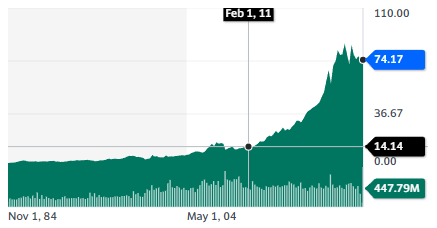
NextEra is one of the leading renewable energy utilities in the USA, with 45.5 GW in capacity and a focus on Florida.
The company is planning an aggressive expansion of its power generation, having already added 2GW in 2023. By 2026, it is targeting an extra 27-35 GW extra capacity. This is expected by the company’s management to generate a 6%-8% growth of earnings per share for the next 3 years.
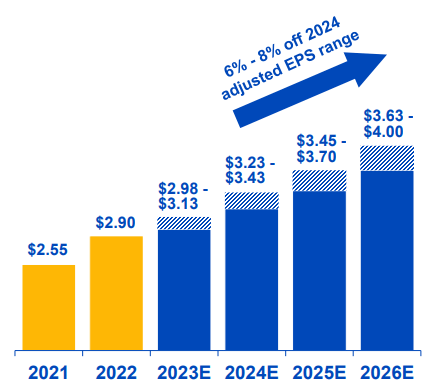
While most utilities are expected to be somewhat stagnant businesses, NextEra offers a solid growth target, operating in one of the most dynamic states in the US. And also one of the most favorable to renewable energy production due to its very southern location. It’s one of the best utility stocks for investors who want a focus on renewables.
2. National Grid plc (NGG)
| Market Cap | $48.97B |
| P/E | 14.25 |
| Dividend Yield | 4.66% |
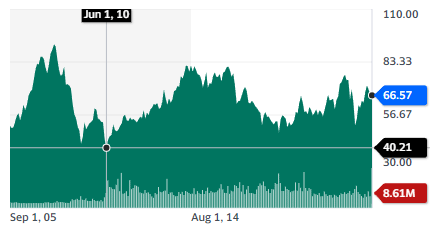
While most utilities are involved in the production of something, like power or water, National Grid is in the business of carrying it to the final consumer. The company is transporting power and gas, both in the US and the UK.
The gas business in the Uk is currently being sold, as well as the Rhodes Island gas and power business. This is financing the purchase of Western Power Distribution, the UK’s largest electricity distribution network operator.
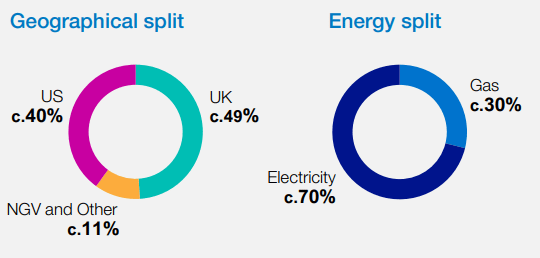
The company is investing massively in future capacity due to the accelerating trend of electrification of heating, cooling, transportation, etc… it will spend up to £40B in capex by 2026, growing the assets of the group by 8-10% CAGR and the earnings per share by 6-8% CAGR, with the dividend to follow the same growth pattern.
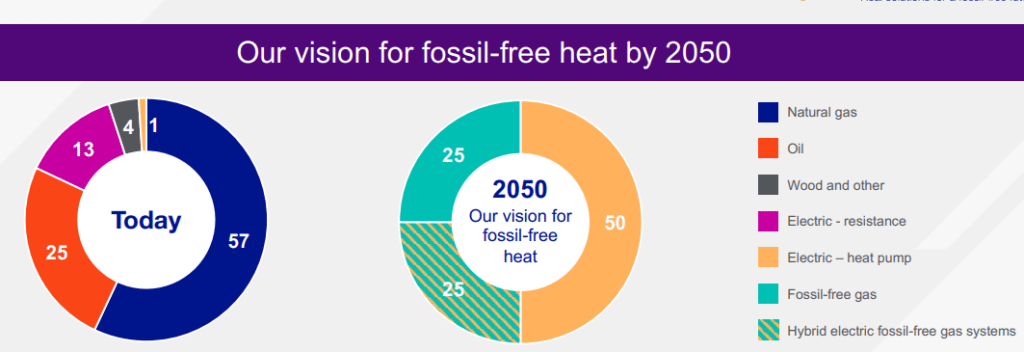
The company has a large debt (£41B) but also a very large asset base to back it up and generates a strong operating profit (£4.5B in 2022).
National Grid is a bet on the continuation of the electrification trend, and the need for a more robust grid allows the massive capex plan to pay off. As a quasi-monopoly in power distribution in its market, this is also an activity with very solid moats, both substitution costs and regulatory protection.
3. American Water Works Company, Inc. (AWK)
| Market Cap | $28.4B |
| P/E | 32.04 |
| Dividend Yield | 1.94% |
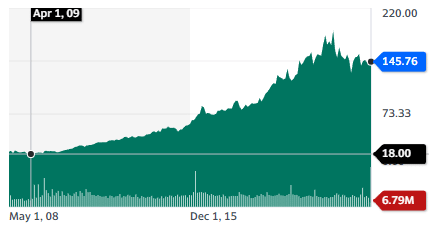
American Water Works provides fresh water to 13 states, as well as the US military. Its largest markets are New Jersey (22.5%) and Pennsylvania (20.9%).

The US water utility market is highly fragmented, and AWW sees it as an opportunity for growth and consolidation. The company is accordingly planning to spend $15B by 2027 in expanding its activity and another $19B in 2027-2032. These investments should provide an 8-9% CAGR growth until 2032.
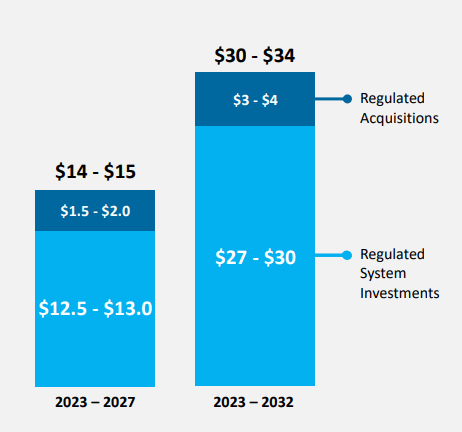
Due to their extremely localized characteristics, water markets tend to work as micro-monopolies even more than power markets, as there is no equivalent for water to large transmission lines between states or regions.
This gives AWW the best of both worlds in terms of the business moat: enough scale to reduce overhead costs and get the best offer from suppliers while facing little competition in its markets. Unfortunately, the stock prices reflect this high quality, so this is one of the best utility stocks for investors looking for safety over yields.
4. Brookfield Infrastructure Partners L.P. (BIP)
| Market Cap | $16.1B |
| P/E | 438.25 |
| Dividend Yield | 4.36% |
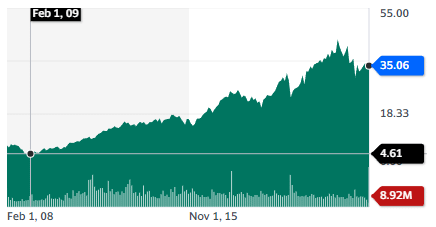
BIP is part of the mega-asset management firm Brookfield, handling $625B in assets. The company deals in many different utilities and infrastructure sectors, notably:
- Electricity and natural gas: 7.9 million connections, 1.5 million customers, and 62,000 km of electric transmission.
- 32,300 km of rail transmission and 3,800 km of toll road.
- 15,000 km of pipelines, 17 natural gas processing plants, and 600 billion cubic feet of natural gas storage.
- 209,000 telecom towers, 46,600 KM of fiber optic cable, 50 data centers, and 2 semiconductor manufacturing foundries.
Most of its activities are in North America (44%), with the rest evenly spread at 18-19% in Europe, South America, and Asia-Pacific.
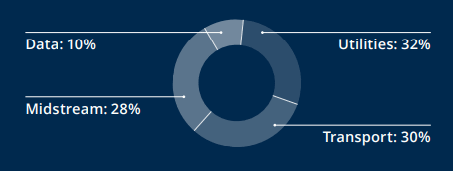
The company is targeting a 5-9% growth annually, a realistic goal compared to its historic track record since 2012 of 11% CAGR for FFO (Funds From Operations).
The company’s highly diversified profile, both geographically and by sector, is its best feature, with investors able to confidently expect it to keep churning out profit and dividends. The backing of Brookfield is also a key quality, as it provides BIP with both cheap funding and a large network of potential partners, suppliers, acquisitions, regulatory authorities, etc…
5. The AES Corporation (AES)
| Market Cap | $13.7B |
| P/E | – N/A |
| Dividend Yield | 3.25% |
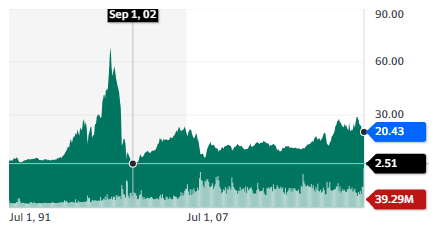
AES is among the fastest-growing utilities in the US, with a strong focus on renewables. The current half of energy produced from fossil fuels will be phased out and reduced to 21% (only gas) by 2027.
It plans to triple its capacities by 2027 and has a total of 4x its current 15 GW capacities in the growth pipeline (68% solar).
This should grow earnings per share by 6-8% CAGR. Part of that growth comes from international markets, with AES expansion in South America, especially Mexico, Chile, and Brazil.
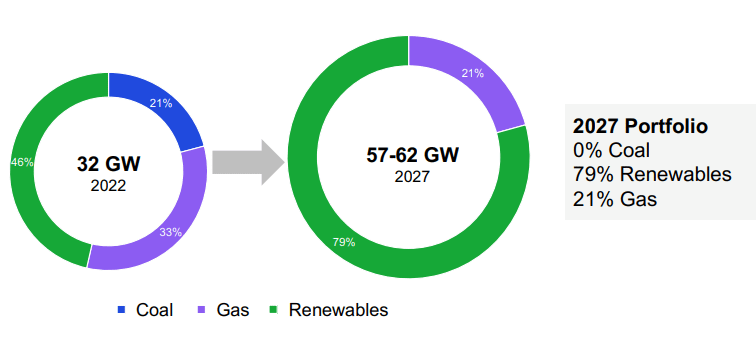
The company is also leading the largest green hydrogen project in the US, a 4B$ project together with Air Product that will utilize 1.4 GW of wind and solar, planned to start in 2027. AES also acquired in June 2023, the largest Solar-Plus-Storage Project in the United States.
The company is showing negative earnings due to a massive $1.54B impairment of capital assets, reflecting a re-valuation of the coal assets.
With its aggressive growth profile and turning away from coal, AES is evolving into a renewable energy giant. Once this is done, it should get back to positive earnings and engage on a quick growth path.
This might be one of the best utility stocks for patient investors looking for quickly a growing utility that might not have been yet priced accordingly by markets and willing to ignore the temporary loss of profitability due to impairments on legacy power generation systems.
6. Tokyo Electric Power Company Holdings, Incorporated – TEPCO (9501.T)
| Market Cap | $6.2B |
| P/E | – N/A |
| Dividend Yield | – N/A |
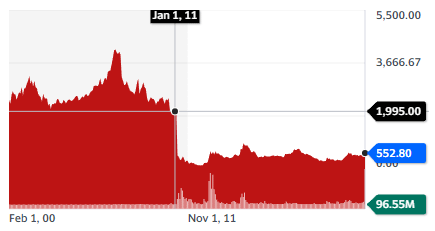
Utilities can be a rather “boring” sector where not much happens. Until something major does. This was the bad surprise shareholders of TEPCO discovered when an Earthquake caused the meltdown of the Fukushima nuclear power plant, causing the stock prices to drop a cliff in 2011.
Since then, the nuclear fleet of Japan has been put on hold, and the country has relied on expensive LNG imports to keep the lights on.
TEPCO is controlling 29% of the country’s electricity sales, making it the 8th largest power company in the world. In comparison, its market capitalization lags far behind, being the 12th in the world.
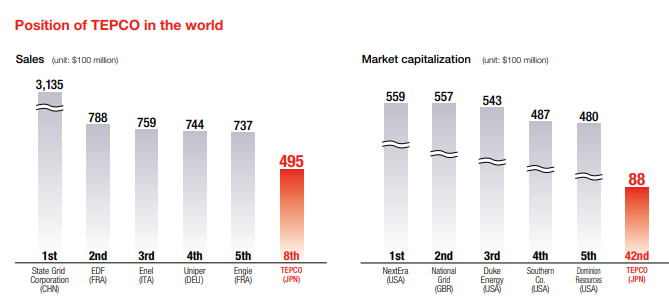
In 2015, 2 nuclear reactors got restarted, with another 8 to have been restored by 2023. This still leaves 16 reactors idle, waiting for restarts. And in practice, only 5 out of 10 “active” reactors are producing power, the rest being in maintenance or under inspection.
While facing some opposition, the war in Ukraine has radically changed the Japanese public perception of energy security, with 51% now supporting the restart of the reactors. The country even plans to build a new nuclear power plant besides restarting the existing one.
TEPCO is also expanding out of Japan, with projects in 21 countries for a total of 4.8 GW.
So overall, TEPCO stock is a bet on Japan returning to the pre-Fukushima crisis situation. This would turn the idle nuclear power plants into money-generating assets again. It would also reduce energy prices in Japan, likely boosting the economy & industries and the power demand.
So with the turn of tides in political stances and public opinion on nuclear, TEPCO is maybe one of the largest potential turnaround stories in the world, with the stock price still lingering at 1/4 of its pre-crisis levels. Although one which carries obvious risks.
💡 Learn more: For those interested in global energy trends, our explanation of the European energy crisis might shed some light.
7. Enel Chile S.A. (ENIC)
| Market Cap | $4.6B |
| P/E | 2.81 |
| Dividend Yield | 10.07% |
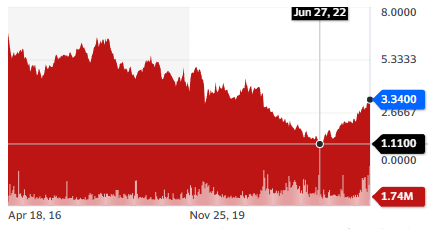
Enel Chile is the largest electricity generation company in Chile, with 8.4 GW of capacity installed and 13.8 TWh of energy distributed, servicing 2.1 million users (10% of the population). It is part of the Italian group Enel.
It produced most of its power through hydropower and renewables and is planning to increase its renewable capacity by 1.9 GW by 2025 (mostly through 1.2 GW of solar). It is also the first Chilean power producer to have finished the phasing out of its coal power generation.
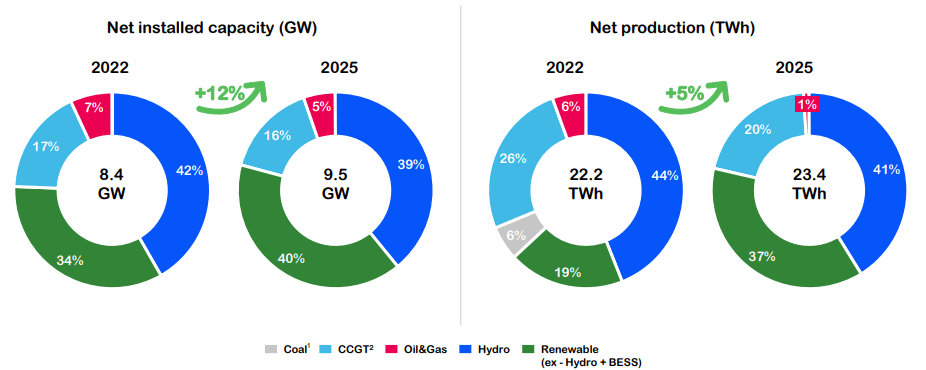
The main attraction of Enel Chile is its low valuation, leading to double digits dividends yield and oddity among utility stocks. This combines a solid growth profile, a low carbon production, and in a country with still a lot of development ahead.
Like all overseas investments, especially in developing countries, this carries some level of risk, as illustrated by the recent political turmoil in Chile.
Best Utility Stock ETFs of 2024
Investors in utilities are often looking for a high level of safety. So it makes sense to have this utility exposure as diversified as possible, and for this, using ETFs can help. It also allows us to get exposure to international utilities, which might not be listed in the US or offered by all brokers.
1. Vanguard Utilities ETF (VPU)
This ETF invests in all sorts of utilities, with a predominance of electric companies. The ETF is focused on the largest US utilities, with top holdings like NextEra, Southern Co, or Duke Energy.
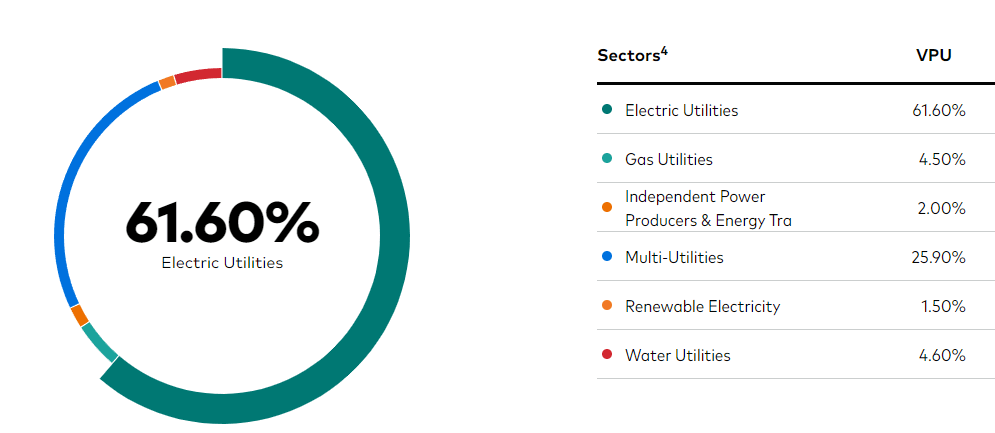
2. FlexShares STOXX Global Broad Infrastructure Index Fund (NFRA)
NFRA offers exposure to utilities all other the world, in all segments, with a focus on developed economies. The focus is on classic utilities, transportation, and communication. This includes among the top holdings Canadian National Railway Company, Verizon Communication, Spain’s Iberdrola, Deutsche Post, Nippon Telegraph, and Telephone Corporation.

3. iShares Emerging Markets Infrastructure ETF (EMIF)
This ETF focuses on utilities from emerging markets and therefore is likely to be both riskier but also more likely to see more growth over time. It even includes airports, with transportation as large as “classical” utilities.

4. MSCI China Utilities ETF (CHIU)
This ETF focuses on Chinese utilities, relying on the country’s economic dynamism and massive population to provide returns to its investors. Electric and then gas utilities dominate this ETF.

Conclusion on the Best Utility Stocks & ETFs
Utilities are an attractive sector for long-term holdings and steady dividends, even if sometimes at a relatively low yield. Most utility companies are also at a historic junction, with renewables making increasingly a larger part of power generation and electrification pushing the demand for power ever higher.
This can be either an opportunity or a risk depending on the profile of the company and its strategic plans.
Other utilities like transportation or water share similar characteristics but might be less exposed to the green transition, both on the upside and downside.
We hope that this list of the best utility stocks and ETFs will make it easier for you to make an informed decision about the best way of going into this market.























